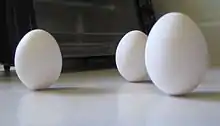Egg balancing
Egg balancing is a traditional Chinese practice that has since been popularized in the United States. Although the irregular shape of eggs makes this somewhat difficult, eggshells typically have many imperfections such that the vast majority can be balanced with minimal effort.[1] Despite folklore connecting this practice to the lunar new year in China, the Dragon Boat Festival in Taiwan[2] and the vernal equinox in the United States, egg balancing can be done throughout the year and has no connection to the gravitational force of the moon or sun.

History
Lichun egg
Egg balancing has been connected with Lichun, the solar term beginning Chinese spring (春) on February 4 or 5 when the sun is at the celestial longitude of 315°. On this day, fresh chicken eggs were balanced on their broad end. In Taiwan, the practice is sometimes connected with the Dragon Boat Festival instead, on the fifth day of the fifth lunar month.[3]
United States
A 1945 Life article reported on "an egg-balancing craze" among the population of Chungking (the interim capital of China during World War II) on that year's Lichun.[4] That article and subsequent followings-up started a similar egg-balancing craze in the United States, but transposed to the vernal equinox beginning Western spring on March 20 or 21 when the sun is at the celestial longitude of 0°. The idea that an egg is easier to balance on the spring equinox has since become an American urban legend, and egg-balancing events are sometimes held on that date.[5] In 1976, New York artist Donna Henes started organizing egg-balancing ceremonies with the stated goal of bringing about world peace and international harmony.[6] These events, which often drew thousands of people, are still held annually by Henes in New York City.
Science
In fact, the balancing of most eggs on their broad ends is not particularly difficult at any time of the year.[1] No physical influence of other celestial bodies on the egg can affect its balance to the extent required by the folk belief. Gravitational and electromagnetic forces, in particular, are considerably weaker and steadier than the disturbances created by the person's breathing and heartbeat.
In 1947, after Japanese newspapers picked up the story, the physicist Ukichiro Nakaya verified experimentally that eggs in fact can be balanced with ease at any time of the year. He noticed that the shell of an egg usually has many small bumps and dimples so that, by turning the egg in different directions, it can be made to touch a flat surface on three points at the same time in many ways. It is not hard to find an orientation such that the egg's center of mass is contained within the triangle spanned by the three contact points, which is the condition for balancing any object.[1] His findings were replicated by astronomer Frank D. Ghigo of the University of Minnesota in 1984.[7][8]
Writing on the subject, Martin Gardner speculated that the folk beliefs inspired people to "try a little harder, be more patient, and use steadier hands" and possibly even to subconsciously sabotage attempts on other days. He compared the self-reinforcing delusion to a "Ouija-board phenomenon ".[5]
Other methods
An easier method (though some regard it as cheating) is to sprinkle salt onto the surface before attempting to balance the egg. The salt crystals make the flat surface more uneven, allowing the egg to balance between a few crystals. Once the egg is balanced, the remaining salt can be gently blown away. The few crystals holding up the egg can be difficult for onlookers to spot.
See also
- Egg of Columbus (mechanical puzzle)
- Easter egg
- Superegg
- "Evidence of Things Not Seen", an episode of The West Wing featuring the American vernal equinox tradition
References
- Ukichiro Nakaya (February 2001) [1947]. "Egg of Li Chun". Essays (in Japanese). 5. Iwanami Shoten.
- -{姜}-義鎮 (2002-06-03). 《台灣民俗與特產》 (in Chinese). 臺灣: 武陵出版有限公司. ISBN 957351205X.
- Huang, Ottavia. Hmmm, This Is What I Think: "Dragon Boat Festival: Time to Balance an Egg". 24 June 2012. Accessed 3 November 2013.
- Annalee Jacoby (March 19, 1945). "Eggs Stand on End in Chungking". Life: 36–37.
- Martin Gardner (May–June 1996). "The great egg-balancing mystery". Skeptical Inquirer. 20 (3). Archived from the original on 2007-02-21.
- The New Yorker. 1983-04-04. Missing or empty
|title=(help) - Schmid, Randolph. "Equinox Returns and Eggs Keep Balancing". Associated Press, 20 September 1987. Accessed 3 November 2013.
- Mikkelson, David & al. Snopes.com: "Infernal Egguinox". 2012. Accessed 3 November 2013.
